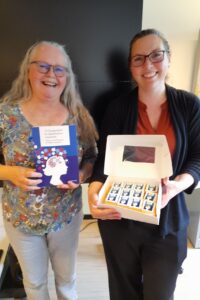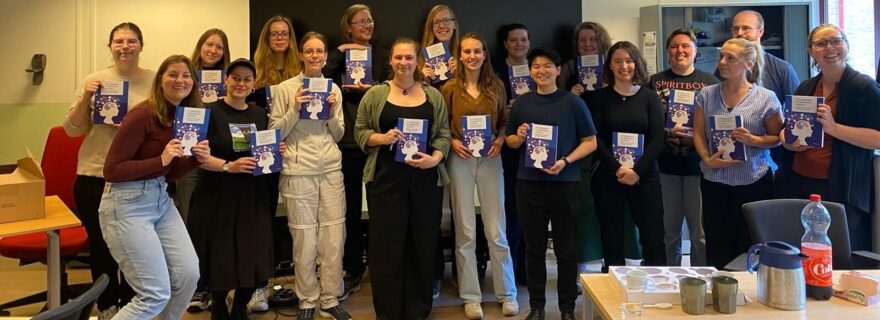Rethinking Translation Education: From Work Integrated Learning to Integrated Learning in Work
What if we flipped the script on traditional work-integrated learning (WIL)? Instead of positioning work as a space to apply learning, what if learning emerged from the work itself: complex, collaborative, and purpose-driven?

This is the premise behind the Virtual Translation Agency that is part of the Master of Arts (MA) Translation course Advanced Translation, offered at Leiden University. As a certified member of the European Master’s in Translation Network, a partnership between the European Commission’s Directorate-General for Translation and Higher Education institutions offering master’s level translation programmes, Leiden’s MA Translation is committed to improving the quality of translator training and graduate employability, a psycho-social learning process that also includes skills and indicators of work readiness (Fugate, Kinicki, & Ashforth, 2004; Holmes, 2013).
As part of this year’s Virtual Translation Agency, students undertook the translation of Jeanine Ever’s Handboek Kwalitatieve Analyse from Dutch to English, a project commissioned by Amsterdam University Press that concluded with a successful book launch. Under the guidance of LUCL Associate Professor Lettie Dorst, students established their own virtual translation agency, aptly named “Think & Thick Translation”, effectively formed teams, assigned different roles (i.e., linguist, terminologist, translator, technology consultant, project manager), and worked individually and collaboratively on the different chapters. This experience allowed them to navigate real-world translation briefs, tight editorial deadlines, and complex academic language. It was more than an assignment and it wasn’t merely a simulation. It was work. And it was learning. At the same time and integrated directly into their academic trajectory.
This model reimagines the boundary between university and workplace. Rather than simulating professional tasks, students were doing the real thing. This is the essence of what Dr Allison Creed from the University of Melbourne calls Integrated Learning in Work (INWORK). The learning outcomes, including linguistic precision, project collaboration, cultural sensitivity, and deadline management, were inseparable from the process of completing the professional translation task.
Importantly, this was not a capstone or internship at the end of the degree. It was embedded in the degree itself, part of a broader shift toward authentic assessment and meaningful learner engagement. Students were assessed not only on their final translation, but also on their communication with major stakeholders, responsiveness to editor feedback, and reflective commentary on linguistic decisions. By integrating self-reflection on their development against the European Master’s in Translation Network Competences Framework into their assessment, students not only enhance their metacognitive awareness—thinking about thinking—of acquired competencies and transferable skills but also cultivate a more robust sense of self-efficacy regarding their professional capabilities. This process-over-product pedagogy fosters psychological capital (Nolzen, 2018) by building confidence and cultivating an agentic mindset on their career development, moving beyond a mere inventory of skills to encompass a deeper understanding of their readiness and adaptability for the evolving professional landscape.
This shift from traditional WIL toward a model of integrated learning in work (INWORK) reflects broader calls to rethink how employability (Harvey, 2001) is developed through Higher Education. Rather than treating employability as a fixed outcome or a box to tick, it becomes a dynamic, iterative process of transition in Higher Education (Creed, 2023) embedded in the act of doing meaningful work (Fleming & Haigh, 2017; Schonell & Macklin, 2019). Recent scholarship has also highlighted the need for stronger alignment between how employability is understood and fostered across both graduate and worker contexts, arguing that current disconnects hinder the development of sustainable and transferable career capabilities (Akkermans, Donald, Jackson, & Forrier, 2024).
As universities seek to offer more than content delivery, courses like this translation project demonstrate how authentic assessment, real clients, and professional accountability can be built into the curriculum. The results? Students who don’t just graduate with knowledge but with confidence, evidence of impact, and a deeper sense of professional purpose. They are work-ready.
As Artificial Intelligence reshapes education and knowledge work alike, we believe universities must rethink how, where, and why learning happens. If knowledge is increasingly accessible, it is the experience of learning and applying that knowledge in context that becomes most valuable. In this context, Integrated Learning in Work (INWORK) is not just a pedagogical strategy, it is a future-focused response to the evolving demands of Higher Education and the world beyond it.
Dr Aletta G. Dorst is an Associate Professor in Translation and Human-centred AI at Leiden University. Her research focuses on metaphor variation, metaphor translation, style in translation, literary machine translation, and machine translation literacy. She leads the NWO research project “Metaphor in Machine Translation: Reactions, Responses, and Repercussions” (2025-2030) and recently led an NRO Comenius Senior Fellow project on “The Value of Machine Translation in The Multilingual Academic Community” (2020-2023). Aletta is currently the lead researcher on two small projects investigating metaphor in literary machine translation and post-editing, funded by the Leiden University Digital Humanities Small Grants and the European Association for Machine Translation.
Dr Allison Creed performs applied research in the field of Cognitive Linguistics, focusing on metaphorical language in communication and education in the fields of wine, career, and Higher Education. Currently a Teaching Specialist in the Faculty of Arts, she holds Masters degrees in Education (TESOL) and Learning and Development, underpinned by a Bachelor of Learning Design. Allison’s research and teaching experience spans applied linguistics, wine marketing, and career development. Her published work appears in the British Journal of Guidance and Counselling, International Journal of Educational and Vocational Guidance, Journal of Career Assessment, the Edward Elgar Handbook of Research Methods in Careers, and Palgrave Macmillan's Management and Marketing of Wine Tourism Business.
References
Akkermans, J., Donald, W. E., Jackson, D., & Forrier, A. (2024). Are we talking about the same thing? The case for stronger connections between graduate and worker employability research. Career Development International, 29(1), 80–92. https://doi.org/10.1108/CDI-09-2023-0252
Creed, A. (2023). Development of the “Transition Is a Becoming” metaphor: The perspectives of international students. In Handbook of Research on Sustainable Career Ecosystems for University Students and Graduates (pp. 38-57). IGI Global. DOI: 10.4018/978-1-6684-7442-6.ch003
Donald, W. E., Baruch, Y., & Ashleigh, M. J. (2019). Striving for sustainable graduate careers. Career Development International 25(2), 90–110. https://doi.org/10.1108/cdi-03-2019-0079
Fleming, J., & Haigh, N. J. (2017). Examining and challenging the intentions of work-integrated learning. Higher Education, Skills and Work-Based Learning, 7(2), 198–210. https://doi.org/10.1108/HESWBL-01-2017-0003
Fugate, M., Kinicki, A. J., & Ashforth, B. E. (2004). Employability: A psycho-social construct, its dimensions, and applications. Journal of Vocational Behavior, 65(1), 14–38. https:/doi.org/10.1016/j.jvb.2003.10.005.
Harvey, L. (2001). Defining and measuring employability. Quality in Higher Education, 7(2), 97–109. https://doi.org/10.1080/13538320120059990
Holmes, L. M. (2013). Competing perspectives on graduate employability: Possession, position or process? Studies in Higher Education 38(4), 538–54. https://doi.org/10.1080/030750....
Nolzen N. (2018). The concept of psychological capital: A comprehensive review. Management Review Quarterly, 68(3), 237-277. https://doi.org/10.1007/s11301-018-0138-6
Schonell, S., & Macklin, R. (2019). Work integrated learning initiatives: Live case studies as a mainstream WIL assessment. Studies in Higher Education, 44(7), 1197–1208. https://doi.org/10.1080/03075079.2018.1425986

